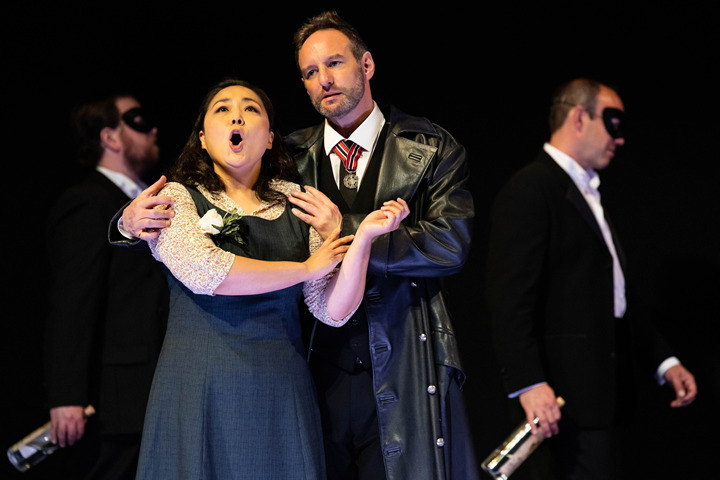| Opera Reviews | 12 May 2024 |
A powerful performance of this Richard Strauss rarityby Catriona Graham |
|
Strauss, R: Daphne |
|
 |
|
|
What an intense young woman! Richard Strauss’s late, one-act opera Daphne is based on the Greek myth of the nymph who was turned into a laurel tree. Scottish Opera produces the creation of Strauss and his librettist Joseph Gregor as a concert performance – perhaps more accurately described as semi-staged. The minimalist set comprises three pendant lights, a table and two bentwood chairs in an otherwise black space, filled with the atmospheric music of the overture. Two men, in white shirts and black trousers, discuss the forthcoming feast, and are joined first by two more and then another three. As they sing, Daphne comes onstage, slightly dreamy, enthusing over the natural world – trees, breeze, birds – begging the light not to fade, for the day to turn to night. Hye-Youn Lee’s fervour is interrupted by Leukippos (Shengzhi Ren), her childhood friend and, now, fervently in love with her. Their conversation is a delicious example of two people not comprehending what the other says. Mother arrives, in the form of a majestic Claire Barnett-Jones in black evening gown, accompanied by a couple of maids. Barnett-Jones is very good but her lowest notes are sometimes lost in the orchestral playing. The two maids, Catriona Hewitson and Inna Husieva, are also in black, complete with top hats, in a nod to Berlin cabaret decadence. They are wicked, teasing Leukippos, before they propose a ruse. When her father (Dingle Yandell) arrives, it is immediately apparent where Daphne gets her intensity. He is almost larger than life with a voice to match, and invokes the gods. His call is answered by Apollo, a swaggering Brad Cooper in black leather coat and top-boots, who promptly falls for Daphne. He attempts to seduce her and his declaration of love is accompanied by the men singing to Dionysus and swigging from bottles. Leukippos now disguised in Daphne’s rejected festive clothes, he is able to sit beside Daphne as they become ‘friends’, till Apollo arrives to conjure up a storm. And what a storm! The orchestral playing is highly effective – great swooshes of sound. He also takes umbrage at Leukippos and shoots him. Daphne is distraught, pouring out her sorrow at Leukippos’ fate; he is not quite dead, he manages a few last words before dying in her arms. Her lament, in which she declares she hears his mournful flute, is accompanied by superb flute-playing. Apollo is, of course, suitably ashamed of himself, grovelling to his fellow gods for letting them down with his bad behaviour. Meanwhile, Daphne is turned into a tree, and Lee’s singing is ecstatic. She really does conjure up the scene with her voice alone. The orchestra is on fine form, giving Stuart Stratford great washes of sound, clear quieter passages and clean harmonies and very impressive percussion. Occasionally, the balance between stage and pit falls in the orchestra’s favour. For all that Emma Jenkins’ staging is monochrome, except for the muted clothes of Daphne and Leukippos, the colours of the natural world are aurally present in this powerful performance. |
|
Photo © Sally Jubb |
|







